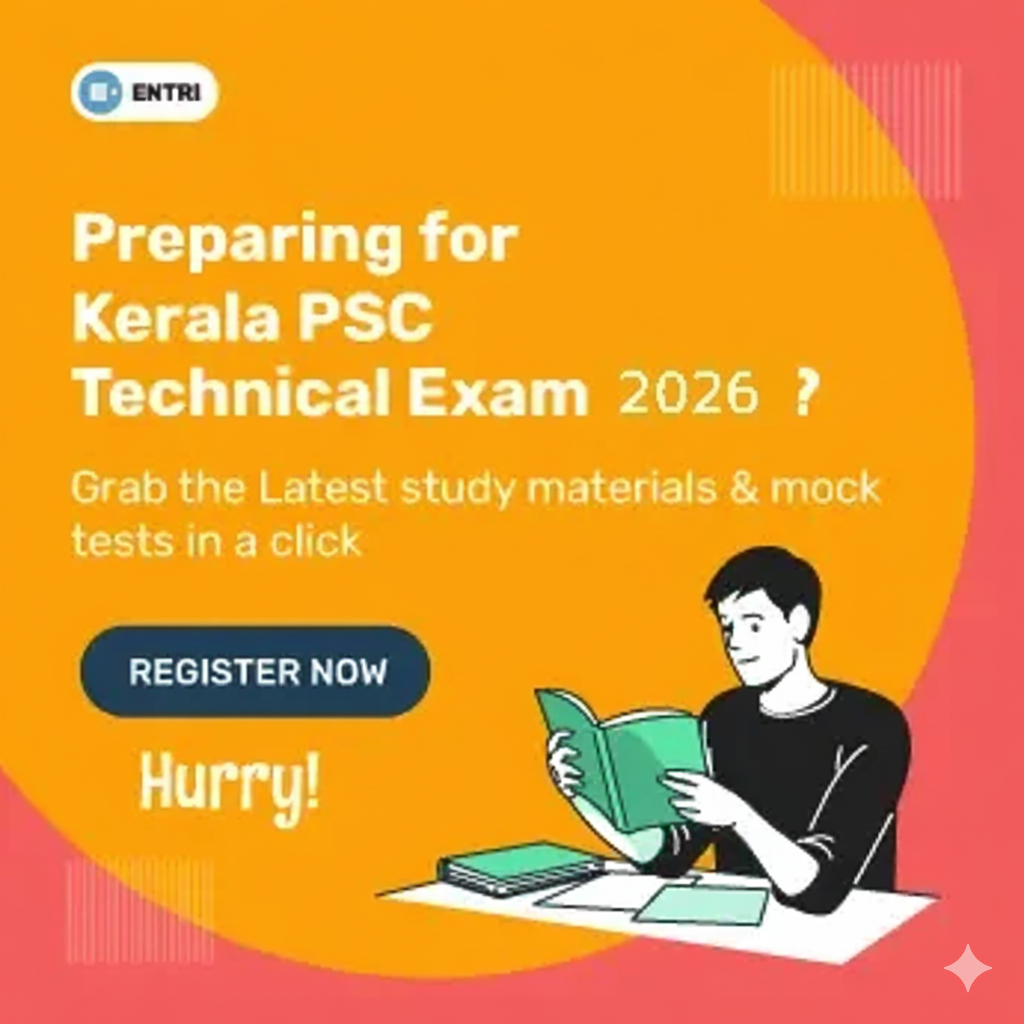Table of Contents
Preparing for the Kerala PSC KSEB Assistant Engineer (AE) 2025 exam requires a focused strategy after the syllabus release. With 100 marks in 100 OMR questions, covering all modules—Electric Circuits, Electrical Machines, Power Systems, Control Systems, Digital Electronics, and more is crucial. Follow a structured KSEB AE study plan 2025 to cover concepts and theories.
Kerala PSC KSEB Assistant Engineer Syllabus 2025 Overview
| Particulars | Details |
| Conducting Body | Kerala Public Service Commission |
| Department | Kerala State Electricity Board (KSEB) |
| Post Name | Assistant Engineer (Electrical) |
| Category Number | 378/2025 |
| Vacancy | 21 |
| Selection Process | By Transfer (10% in-service quota) |
| Application Status | October 15, 2025 |
| Last Date to Apply | November 19, 2025 |
| Official Website | https://www.keralapsc.gov.in/ |
Kerala PSC AE Electrical Previous Year Question Paper 2025 PDF Download
1: Between the period of 1858-1947, how many Viceroys ruled over India?
| Exam | |
| 129/2024 | |
| 225/2023 | |
| 193/2014 | |
| 030/2016 | |
| 2008 |
Prepare for Kerala PSC Technical Exams with Entri
സർക്കാർ ജോലി എന്ന സ്വപ്നം ഇനി സ്വപ്നം മാത്രമല്ല! Join Kerala's Top-rated PSC Coaching Programs
Join NowDownload KSEB Assistant Engineer (Electrical) Syllabus 2025 PDF
KSEB AE syllabus covers all the essential topics like Electric Circuits, Electrical Machines, Power Systems, Control Systems, Digital Electronics, Measurements, and more. Going through the syllabus first helps you plan your study.
KSEB Assistant Engineer (Electrical) Study Plan 2025
Prepare for the KSEB AE (Electrical) 2025 with a 4-month study plan. Focus on all key topics!
Month 1 – Foundation & Core Concepts (Weeks 1–4)
| Week | Modules | Topics | Study Plan |
|---|---|---|---|
| 1 | Module 1: Electric Circuits | Kirchhoff’s Laws, Max Power Transfer, Star/Delta, Energy in Capacitor/Inductor | Day 1-2: Kirchhoff’s Laws + Star/Delta Transformation
Day 3-4: Max Power Transfer + Energy in L & C Day 5: Coupled Circuits & Dot Convention Day 6: Sinusoidal steady state analysis Day 7: Revision + practice problems |
| 2 | Module 1 cont. | AC circuits, Resonance, Series & Parallel RLC | Day 1-2: Generation of AC, rms, average, peak factor, form factor
Day 3-5: Series RLC, Resonance, Bandwidth Day 6: Parallel resonance Day 7: Revision + Problem solving |
| 3 | Module 2: Magnetic Circuits | Permeability, Magnetic field, Magnetic potential, Faraday & Lenz | Day 1-2: Magnetic field strength, Potential, Relation to electricity
Day 3-4: Series & Parallel Magnetic Circuits Day 5-6: Faraday’s Law, Lenz’s Law, Induced EMF Day 7: Revision + Problem solving |
| 4 | Module 3: Electrical Machines (Part 1) | DC Machines, Transformers | Day 1-2: DC Generator – construction, working principle, types, emf equation
Day 3-4: DC Motor – working, armature & field control Day 5: Single Phase Transformer – working, equivalent circuit, losses Day 6: Three Phase Transformer – construction, difference between power & distribution transformer Day 7: Revision + MCQs |
Month 2 – Machines, Digital, and Power Systems (Weeks 5–8)
| Week | Modules | Topics | Study Plan |
|---|---|---|---|
| 5 | Module 3 cont. | Alternators, Synchronous & Induction Motors, Special Machines | Day 1-2: Alternators – construction, working principle
Day 3: Synchronous Motor – working, starting methods, synchronous condenser Day 4-5: Three Phase Induction Motor – slip, torque, torque-speed curve Day 6: Special Machines & Applications Day 7: Revision |
| 6 | Module 4: Digital Electronics | Number Systems, Combinational circuits | Day 1: Number systems & Codes
Day 2-3: Adders (Half & Full), Multiplexers, De-multiplexers Day 4-5: Flip-flops, Registers, Counters Day 6: DAC & ADC Day 7: Revision + Practice Problems |
| 7 | Module 4 cont. + Module 5 (Power Systems) | Microprocessors (8085), Line parameters, Insulators | Day 1-2: 8085 Architecture, Instruction set, Machine cycles
Day 3: Timing diagrams & Addressing modes Day 4: Line parameters, Insulators, Corona effect Day 5: Circuit breakers, CTs, PTs, Relays Day 6: Per unit system, Symmetrical components Day 7: Revision + practice |
| 8 | Module 5 cont. | Faults, Stability, Load Flow | Day 1: Symmetrical & unsymmetrical faults
Day 2-3: Power system stability – steady, dynamic, transient Day 4: Power angle curve Day 5-6: Load Flow Analysis – Gauss Siedel, Newton-Raphson, Fast decoupled Day 7: Revision + Practice |
Month 3 – Control, Power Electronics, Measurements, Signals (Weeks 9–12)
| Week | Modules | Topics | Study Plan |
|---|---|---|---|
| 9 | Module 6: Control Systems | Transfer Function, Block Diagram, Time-domain, Stability | Day 1-2: Transfer Function, Block Diagram, Signal Flow Graph, Mason’s Gain
Day 3: Type & Order of Systems, Characteristic Equation Day 4: First & Second order responses, Time domain specs Day 5: Static error coefficients, Routh’s criterion Day 6: Revision + Problems |
| 10 | Module 6 cont. + Module 7: Power Electronics | Frequency-domain, SCRs, Rectifiers | Day 1: Frequency domain, Bode & Polar plots
Day 2: Gain & phase margin, Stability analysis Day 3-4: SCR structure, characteristics Day 5-6: Fully/Half controlled rectifiers, inverters Day 7: Revision + Problems |
| 11 | Module 7 cont. | Choppers, Op-amps | Day 1: Single, Two, Four quadrant choppers
Day 2-3: Op-amp fundamentals, properties, differential amplifier Day 4: Gain, CMRR, Slew rate Day 5: Applications Day 6-7: Revision + MCQs |
| 12 | Module 8: Measurements & Instrumentation | Instruments, Power Measurement, Oscilloscope | Day 1: Measurement standards, Errors, Instrument classification
Day 2: Ammeters & Voltmeters (MC, MI) Day 3: Dynamometer Wattmeter, Three phase power measurement Day 4: Energy Meters – Single phase, Digital, TOD Day 5-6: Oscilloscope – operation, vertical/horizontal deflection Day 7: Revision + MCQs |
Month 4 – Signals, Transducers, Batteries, Wiring + Revision (Weeks 13–16)
| Week | Modules | Topics | Study Plan |
|---|---|---|---|
| 13 | Module 9: Signals and Systems | Signals, Systems, Sampling | Day 1: Classification of signals, basic operations
Day 2: System properties – linearity, causality, stability Day 3: Sampling process, Impulse train, Sampling theorem Day 4: Aliasing, Zero & First order hold circuits Day 5-6: Revision + Problem solving Day 7: MCQs |
| 14 | Module 10: Transducers, Batteries, Wiring | LVDT, Hall effect, Batteries, Wiring | Day 1: LVDT, Angular displacement, Hall effect transducers
Day 2: Batteries – Primary, Secondary, ratings, grouping Day 3: Wiring systems, Domestic wiring rules Day 4: Earthing – types, rules Day 5: Illumination laws, Electric lamps Day 6-7: Revision + MCQs |
| 15 | Full Syllabus Revision | All modules | Day 1-2: Modules 1–3
Day 3-4: Modules 4–6 Day 5-6: Modules 7–10 Day 7: Full-length Mock Test |
| 16 | Final Revision & Practice | Weak areas + Previous papers | Day 1-2: Focus on weak modules
Day 3-4: Solve previous year papers Day 5-6: Full-length Mock Test 2 & 3 Day 7: Formulae & Shortcut Revision |
KSEB AE (Electrical) Preparation Tips
- Understand all key concepts clearly.
- Follow a daily study schedule.
- Practice problems regularly.
- Solve previous year papers and mock tests.
- Focus on weak areas and revise often.
- Manage time effectively during preparation











